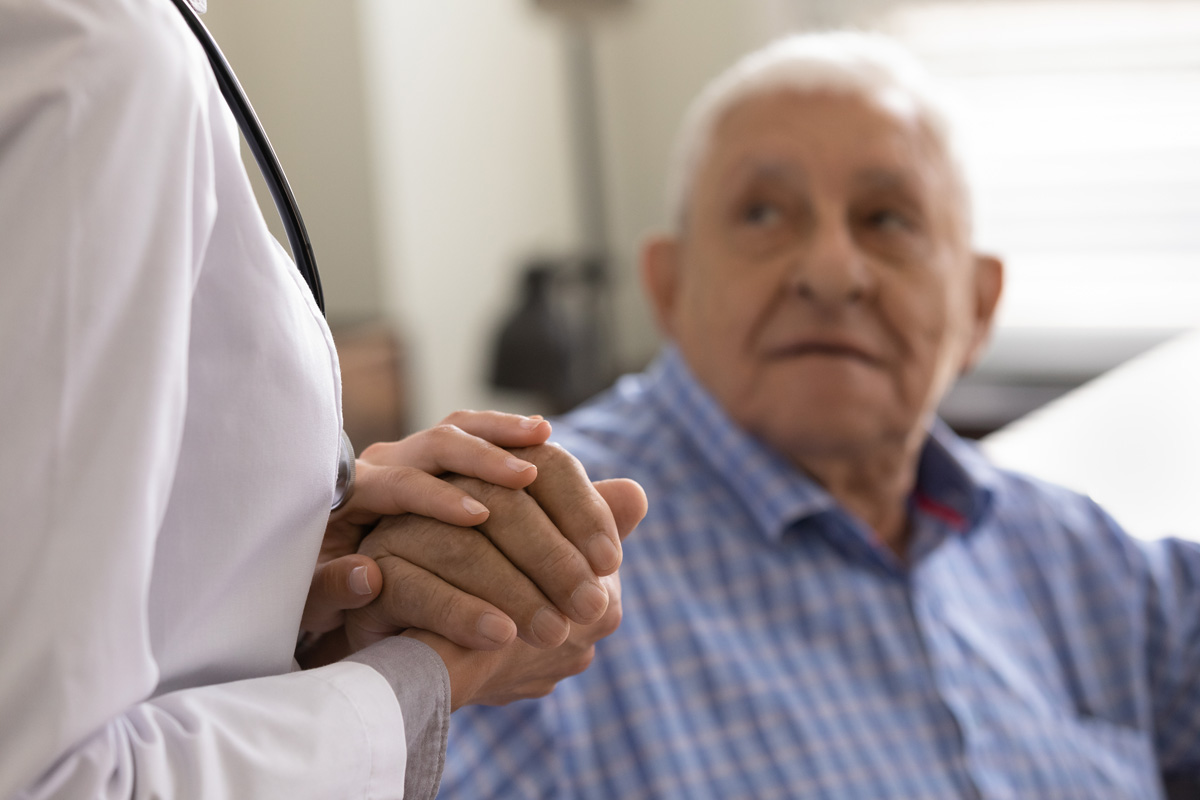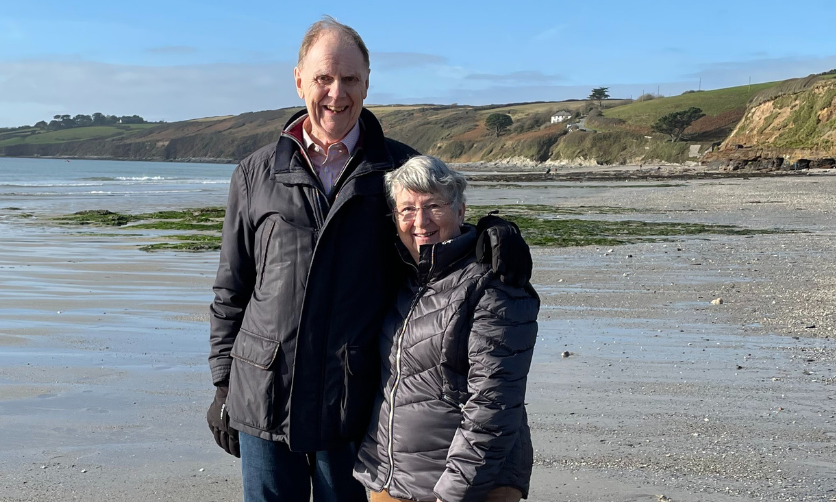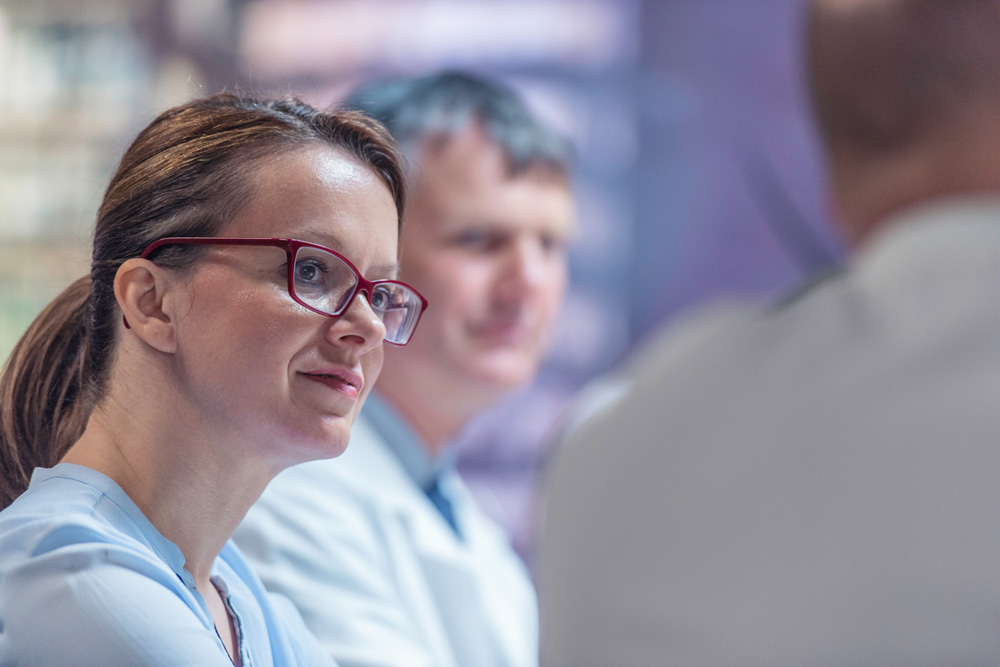- Patients
- Cancer diagnosis
- Pathology tests
- Transperineal prostate biopsy

Transperineal prostate biopsy
We offer transperineal prostate biopsies using local anaesthetic – a convenient option with no hospital stay required. We’ll provide results quickly so you can get answers as soon as possible.
What is a transperineal prostate biopsy?
A transperineal prostate biopsy is a diagnostic procedure used to take small tissue samples from your prostate gland. It’s performed by your consultant using local anaesthetic in one of our specialist outpatient clinics – so there’s no general anaesthetic and no hospital stay required.
An MRI of your prostate will have been arranged by your consultant prior to any biopsy.
During the procedure, your consultant will use an ultrasound probe to create images of your prostate. They’ll use information about suspicious areas from the MRI scan of your prostate to highlight target areas in the live ultrasound images. This helps them guide a needle to the correct area and take samples of your prostate tissue. The removed samples are sent to a lab for analysis under a microscope and the results are sent back to your consultant, usually within seven to 14 days.
The biopsy results will show whether the prostate cells are cancerous or if your cancer has changed. We can also use this type of biopsy to diagnose other conditions such as benign prostatic hyperplasia (BPH), prostatitis and prostatic intraepithelial neoplasia (PIN).
You may also hear this type of biopsy called an MRI targeted prostate biopsy.
Why do I need a prostate biopsy?
- High PSA levels in your blood
- A lump on your prostate that was found during a digital rectal examination
Book an appointment
If you’re worried about symptoms or would like a second opinion, enquire now for more information and to book an appointment.
I would wholeheartedly recommend having this procedure if it’s suggested for you. Mine was done under local anaesthetic in just 30 minutes, and was quick and painless
Shaun, Transperineal prostate biopsy patient
What is a Vector prostate biopsy?
Our UrologyHubs in Cambridge and Windsor now offer transperineal Vector prostate biopsies – an innovative and highly accurate, prostate biopsy technique using image fusion software and recent advances in tracking technology to improve accuracy and your comfort during the local anaesthetic procedure and reduce side effects.
In a standard transperineal prostate biopsy, the ultrasound probe in the rectum is moved around, which can cause discomfort and distort the match between the MRI image and the live ultrasound image. Often several needle entry points are required to take the biopsies.
In a Vector prostate biopsy, the advanced technology used means the ultrasound probe remains stationary and only two injections in the perineum are needed for the samples. This helps improve your comfort and the accuracy of the match between the live ultrasound imaging and MRI scan.
Side effects like inability to pass urine, pain and risk of infections are very minimal with the additional convenience of having the procedure performed under local anaesthetic
You can expect the procedure to last around five minutes, but it may take a little longer if your urologist is taking some biopsies or urine samples.
Book an appointment
Find out more about Vector prostate biopsies at our Cambridge and Windsor UrologyHubs.

The procedure was a bit of a non-event if I’m honest. I had it done with a local anaesthetic and felt no discomfort during or following the procedure. I went straight home after and although I took it a little easy, I was absolutely fine. My results came back very quickly.
David, Vector prostate biopsy patient
What happens at a prostate biopsy?
Both transperineal prostate biopsies and Vector prostate biopsies are performed under local anaesthetic. This means you don’t need a general anaesthetic and can leave the centre after your appointment. You can also eat and drink as normal before your appointment. You should continue taking medication as usual before your procedure. However, you may need to stop any blood-thinning medication before your biopsy. We’ll discuss this in more detail with you.
You can expect the procedure to last around five minutes, but it may take a little longer if your urologist is taking some biopsies or urine samples.
What to expect on the day
Before the procedure, your consultant may examine your prostate and assess its size and feel. You’ll then lie on a treatment couch on your back. Once you’re ready, your consultant will insert an ultrasound probe into your back passage. This feeds an ultrasound image onto a screen. Your consultant will guide the needle into the suspicious areas in your prostate either by sight or using software that overlays your previous MRI scan onto the live ultrasound images.
Before performing the biopsy, your consultant will apply a local anaesthetic to the area to reduce any discomfort. Once the area of your prostate is numb, they’ll insert the needle through the perineum and into the prostate.
Once a small number of samples have been taken, a firm dressing or a pad may be applied to the insertion site. You’ll be asked to stay in the centre until you’ve passed urine, after which you can go home.
You should allow around one hour for your appointment. The procedure itself will last 20 to 45 minutes.
We offer prostate biopsies using local anaesthetic, so you can leave the centre after the appointment, which should take 20-45 minutes. This means you don’t need to be sedated or put under general anaesthetic in a hospital.
During the procedure, your consultant will apply a local anaesthetic to your perineum, where the biopsy needle will enter, to reduce any discomfort.
Most men experience only mild discomfort after the procedure, but some men find a prostate biopsy painful. If you need to, you can take over-the-counter painkillers such as paracetamol if you need to and your consultant hasn’t told you not to for any reason. If the pain doesn’t go away, speak to your doctor.
Your consultant will explain what to do after the procedure to help the biopsy site heal and reduce the risk of complications. They’ll explain:
- You shouldn’t need painkillers, but you can take over-the-counter painkillers such as paracetamol if you need to and your consultant hasn’t told you not to for any reason
- You’ll be given an absorbent pad to place in your underwear in case of any bleeding – you should apply gentle pressure and a cold compress to the biopsy site if you do notice any
- Stay hydrated for the remainder of the day after the biopsy, and over the following few days have a mug or glass of fluid every hour during waking hours
- Avoid soaking the area in the bath for at least 24 hours after the procedure, but you can bathe as normal once any bleeding has stopped
- Avoid straining when going to the toilet and avoid any lifting, bending, stretching or any heavy jobs or sports for three days after the procedure
You’ll also be given a leaflet with this information to take home with you.
After the procedure, your care team will monitor you for around 30 minutes and once you’ve passed urine you’ll be able to go home. This is because the biopsy can cause the prostate to swell and make it difficult to urinate.
You may notice a small amount of blood in your urine or stool for around two weeks, or in your semen for around two months. This is normal, but if it doesn’t clear or there’s a lot of blood or clots, speak to your doctor straight away.
There are complications that may occur as a result of your biopsy. Your consultant will explain all of these before your procedure.
You should let us know straight away if you have any signs of infection after your procedure, including:
- A high temperature
- A lot of difficulty passing urine
- A need to pass urine very often
- A lot of blood in your urine or stool
- Shivering or shaking
- Inability to pass urine
Other side effects may include:
- A small amount of blood in your urine and stool
- A small amount of blood in your semen – this won’t harm you or your sexual partner
- Bruising in your back passage or around the insertion site
- Discomfort in your prostate caused by the bruising
- Difficulty in getting or maintaining an erection
Getting your prostate biopsy results
Seven to 14 days after your biopsy
Your consultant will organise a second appointment with you, either face to face, phone or by Telehealth video conferencing, to discuss your results.
What happens if cancer is found?
We know this can be a worrying time, and we’re here to support you. Your consultant will explain your diagnosis and treatment options, listen to your concerns, and answer any questions you may have. They’ll also discuss your case in a multidisciplinary team with other prostate cancer specialists to decide the best treatment plan tailored to your needs. If we need to conduct further tests or scans to establish more about the cancer, we can arrange these for you without the wait so you can start treatment as soon as possible.
More than treating your cancer
We also offer all of our patients integrative care, such as counselling through our partnership with the Penny Brohn UK charity. Some of our centres provide exercise medicine, which is proven to help reduce side effects of treatment and speed up your recovery.
Read next

Doctors
Our doctors
GenesisCare works with many leading and experienced cancer doctors who share our commitment to providing excellent patient care

Centres
Our centres
With 440 centres across the world, we're continuing to diagnose and treat without delay, bringing specialist care closer to our patients in the UK, Spain, Australia and the US.

Cancer care
Exploring cancer care
We are the UK’s leading private provider of advanced radiotherapy and cancer care. We offer fast access to the latest technology and treatments that has been proven to make a difference.

Cancer care
How can we help?
Accessing world-class cancer care is easier than you think. Follow these easy steps to get treatment, tests and scans, or a second opinion at GenesisCare, and find out the different ways of funding your cancer care.

Patient support
Patient stories
We believe patients can be our teachers and trusted advisers, benefiting from their unique experiences.